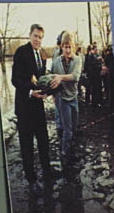My Own Flooded Town
I've never been to New Orleans. There were a couple of times I had planned to, but those fell through and I will never get the chance to know that city as it once was. Right now there is still water everywhere and a lot of confusion. I have been there.
Hundreds of years ago, the Native Americans had a crazy idea that it would be good to put a city at the conflux of three rivers. Something about making it easier to trade goods and launch attacks against rival tribes. Some sort of cockamamie foundation-of-civilization thing like that. White men arrived, negotiated settlements with local tribal leaders and built a city. It's a great city, but being as it sits on those handy waterways it has a habit of really flooding every hundred years or so. For one week in 1982, all three rivers jumped their banks and my hometown stood under water.
As the waters rose, we had nowhere to turn. No National Guard could get there in time, and we had to call on our own citizens. 30,000 people showed up to fill sandbags and pass them from man to man as we reinforced the useless, waterlogged dikes. 18,000 of those people were kids. I was one of those kids who reported to a sandbag station, and I will go to my grave remembering the way the overhead lighting at the City Garage cut through the winter dark. I'll remember the way my knuckles bled from the chafing cold and coated nylon of the sandbags. I'll remember the cold sandy mud under my fingernails. You can't scoop it into the bags as well with the gloves on, and we were in a hurry. We wanted to save our neighbors' homes, and mud does wash off with the same water that washes over the banks. For days we built those temporary walls and we all felt that while none of us was very significant on our own, we could all stem the tide by working together. And we did.
On March 16th, we had an additional sandbagger of some reknown.

These experiences and images are the foundation from which I approach the New Orleans situation today. I realize that their experience is much different and the waters are much higher and more foul. I can't help but wonder, though. Would there be less looting and grief if the people felt they could be of some use? If they felt that instead of being trapped in a miasma of their own waste they could do something? I doubt those few bags I filled for my father to tie off made much difference in and of themselves, but he and I both felt better about our place in the world. I doubt the few sandbags that Reagan hefted made much difference either. But the sight of the world's most powerful man standing in the water in his suit, working along side a bunch of ordinary people to combat nature still moves me. You can argue, rightly so, that it was a photo op. Nevertheless, the water was still bone-chillingly cold, the bags were still heavy and they still cut your hands. And that President pitched in alongside schoolchildren and unemployed factory workers to beat nature at her own game.
Fort Wayne was made stronger when we realized what we could do with strong backs and strong hearts. We rebuilt and renewed. I hope that New Orleans can do the same, and that I'll finally be able to visit.


3 Comments:
I remember that. I was living in Muncie, IN at the time, and I was 7. We got flooded, too, though not NEARLY as bad as y'all, but I remember my grandpa coming over to our house in a canoe, haha. Thanks for the memories. :)
Perfectly described. A tribute to our town. One of my formative memories, too. There is something so powerful about being part of a large group working together to fight a common problem.
Thats actually the best flood story I've ever heard. I never knew Reagan did that.
You are probably right, having all those people work, put themselves to use somehow, might have saved some sanity down there.
Post a Comment
<< Home